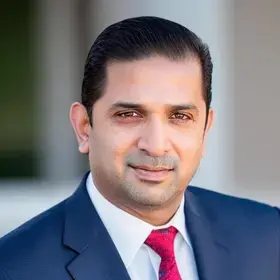This past July, Columbia University School of Professional Studies welcomed Michael Schwam-Baird (‘16GSAS) to the Political Analytics program as an associate professor of professional practice. Joining the program is a homecoming for Schwam-Baird. Back in 2016, he successfully defended his dissertation on the motivations and behavior of people who contribute to political campaigns and received his PhD in political science at Columbia.
Today, after spending a number of years as a manager and data scientist in the political analytics field (where he continues to consult), Schwam-Baird is teaching the next generation of political analysts in courses like Introduction to Political Analytics and Campaign Finance & Fundraising Analytics.
In this interview, he reveals what students should expect in class, what inspired him to study political behavior, and what places he loves to visit near Morningside campus.
What excites you about the new M.S. in Political Analytics program?
After completing my PhD in Political Science in 2016, I worked in the field of political analytics for seven years, most recently as the head of data science at a firm called Grow Progress. In that role, I hired a number of wonderful data scientists from a variety of academic and professional backgrounds. But nearly all of us (myself included when I first left graduate school) lacked a background in the application of data science to applied politics, meaning politics as it is actually practiced by campaigns, advocacy groups, and the firms that support them. This is a quickly growing field that uses techniques from survey research, experiments, modeling, and other disparate areas to help practitioners make data-driven decisions on a fast timetable.
What excites me about this program is that we’re bringing together all of these approaches under one roof and uniting the theoretical with the applied. The people who come through the program will be exposed to all of the main techniques used in political analytics, taught by top academics, and also understand how they’re used in the day to day to make decisions. As someone who recruited and hired in this field for a number of years, I find it exciting to see a program devoted to giving people the exact background I was looking for.
Briefly describe the course you'll be teaching. What should the students expect?
This semester, I’m teaching Introduction to Political Analytics, which is a statistics and R programming course designed to get new students ready to succeed in the subsequent courses in our program. We also discuss how various methods are applied in the political space.
I’m also teaching Campaign Finance and Fundraising Analytics. Campaign finance is a particular interest of mine and was the subject of my dissertation. This course covers the history and current state of campaign finance law and regulation, what motivates donors to give and what they may (or may not) receive in return, and how campaigns themselves raise and spend their billions. Students also analyze publicly available campaign finance data to understand how specific campaigns or interest groups strategically raise and spend their money. It’s a really fun subject and course.
What inspired you to specialize in American politics, specifically campaign finance, lobbying, political persuasion, public opinion, and experiments?
I came to the study of American politics because I wanted to understand how power works in our country and how different groups are able to get (or can’t get) what they want. Campaign finance and lobbying are a big part of that story. But once you get into the weeds of any complex topic, you realize it’s very hard to tell a clear causal story about what leads to what. And that’s what attracted me to experiments (and other methods) that try to understand causality in the political context. And since I’ve spent a lot of my professional life helping campaigns understand what works when communicating with voters, these methods were just what I needed in my work after graduate school.
What old haunts are you looking forward to visiting on Morningside campus?
Well, I never really left the neighborhood! After finishing at Columbia, my family and I moved all the way to the other side of Morningside park in Harlem, where we’ve been living ever since. So I’m a 10-minute walk from campus. For a lot of special celebrations, like birthdays, we like to go to Pisticci on LaSalle Street, just off of Broadway. They have great Italian food and really good lemon ricotta pancakes if you go for brunch. We’re also regulars at Community Food & Juice. Whenever my parents are in town, they go straight to The Hungarian Pastry Shop for horseshoe almond cookies and Book Culture for something to read. And my corner of Harlem (just on the other side of the park) has a ton of cool places too, including Silvana (great Middle Eastern food), Lido (Italian), Levain (bakery with monster cookies), and BO’s Bagels, which is excellent and has a much shorter line than Absolute Bagels (also recommended). Just to name a few…
What is your advice for students pursuing a career in political analytics or politics in general?
You need real political experience in addition to solid training in analytics. That’s why working with a campaign or firm over the summer is a great idea, and why we’re going to have capstones that require students to apply their knowledge to a real political problem. But there’s no replacement for working on or with a campaign. When you see how quickly things move, you realize that you have to be ready to adapt and translate what you’ve learned in an academic setting for decision-makers on the ground.
About the Program
The M.S. in Political Analytics program is designed to fill an important role in the rapidly developing field of data analytics as it is applied to politics and advocacy, allowing students who are interested in new approaches to data analytics—such as machine learning—to integrate those interests with a politics or advocacy focus. Furthermore, it will provide a clearer professional trajectory by helping students acquire necessary skills and suitable employment after graduation.


